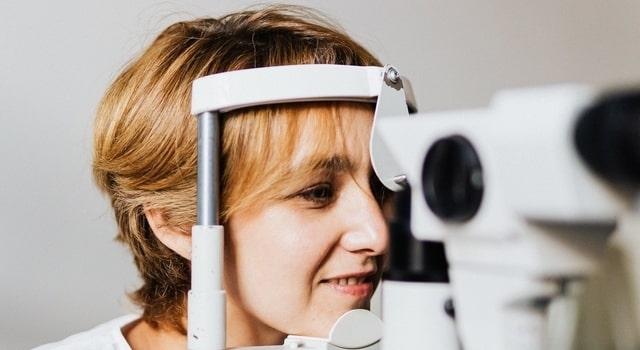
Eye exams are crucial to maintaining healthy vision, but not all exams provide the same level of care. If you’ve ever had a vision screening—whether at school, work, or the DMV—you may have noticed that it was quick and simple, focusing only on whether you could see clearly.
But there’s much more to eye health than just visual clarity. At Ogden Vision Center, we want to explain the difference between a vision screening and a comprehensive eye exam so you know why a thorough exam is essential for your long-term eye health.
What Is a Vision Screening?
A vision screening is a basic test that primarily focuses on how well you can see. It flags any significant issues with vision, such as nearsightedness, farsightedness, or astigmatism, but it doesn’t provide an in-depth assessment of your eye health.
Here’s what you can expect from a typical vision screening:
- Quick Testing: Vision screenings are usually very brief, taking only a few minutes to check your ability to see letters on a chart from different distances.
- Basic Purpose: These screenings identify individuals who may need corrective lenses but cannot detect other eye conditions or diseases.
- Limited Scope: Because they only assess vision clarity, vision screenings don’t evaluate the health of your eyes or check for common eye diseases like glaucoma or macular degeneration.
While vision screenings are a good starting point for identifying potential vision problems, they don’t provide comprehensive information to ensure overall eye health.
What Is a Comprehensive Eye Exam?
A comprehensive eye exam, on the other hand, is a detailed assessment of both your vision and the health of your eyes. Conducted by an optometrist, this type of exam goes far beyond a simple vision test.
At Ogden Vision Center, our comprehensive eye exams include the following steps:
Patient History Review
Your optometrist will ask about your overall health, medications, and any eye symptoms or vision issues you’ve been experiencing. Understanding your health background helps us identify potential risk factors for eye conditions.
Visual Acuity Test
Like a vision screening, a comprehensive exam includes a visual acuity test to measure how well you can see at various distances. This helps determine if you need a new prescription for glasses or contact lenses.
Refraction Testing
If we detect a vision problem, the optometrist will perform refraction testing to fine-tune your prescription. This ensures that your corrective lenses provide the clearest vision possible.
Eye Health Evaluation
A comprehensive exam also includes a thorough assessment of your eye health. The optometrist will use specialized tools and techniques to check for common eye diseases such as glaucoma, cataracts, and macular degeneration. Early detection of these conditions is crucial for preventing long-term vision loss.
Pupil Dilation
Your optometrist may use eye drops to dilate your pupils, allowing them to examine the retina and optic nerve more closely. This is especially important for detecting issues like diabetic retinopathy or retinal detachment.
Eye Pressure Measurement
The tonometry test, which measures the pressure inside your eye, is vital for detecting glaucoma, a condition that can cause irreversible vision loss if not treated.
Peripheral Vision Testing
A comprehensive exam often includes testing your peripheral vision (side vision) to ensure there are no blind spots or abnormalities that could indicate a larger issue.
Why Is a Comprehensive Eye Exam Important?
While vision screenings are useful for identifying basic vision problems, they are not a substitute for a comprehensive eye exam. Here are some key reasons why a full exam is essential:
- Early Detection of Eye Diseases: Many serious eye conditions, such as glaucoma and macular degeneration, don’t have obvious symptoms in the early stages. Comprehensive exams can catch these issues before they progress, increasing your chances of effective treatment.
- Customized Vision Correction: If you need corrective lenses, a comprehensive eye exam ensures that your prescription is accurate, reducing the risk of eye strain and headaches caused by an outdated prescription.
- Overall Eye Health: A comprehensive exam evaluates the entire eye, including your retina, cornea, and optic nerve, helping to detect conditions like cataracts or dry eye that could affect your comfort and vision.
Who Should Get a Comprehensive Eye Exam?
Everyone can benefit from regular comprehensive eye exams, regardless of age or current vision status. Here’s how often different groups should request exams:
- Children: Kids should have a comprehensive eye exam before starting school and regularly throughout their school years to detect vision problems that could affect their learning.
- Adults: We recommend that adults have a comprehensive eye exam every one to two years, especially if they wear glasses or contact lenses.
- Seniors: As we age, the risk of eye diseases increases, making regular comprehensive exams even more important. Seniors should have their eyes checked annually to monitor for age-related conditions like cataracts or macular degeneration.
Take Control of Your Eye Health
At Ogden Vision Center, we’re committed to helping you protect your vision and overall eye health. If it’s been a while since your last comprehensive eye exam or you’ve never had one, now is the perfect time to request an appointment.
A full exam ensures we catch any potential problems early and your prescription is up to date.
Request your comprehensive eye exam with us and take the first step toward healthier eyes and clearer vision.
